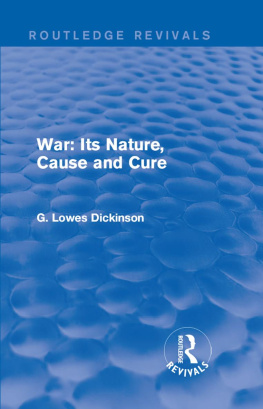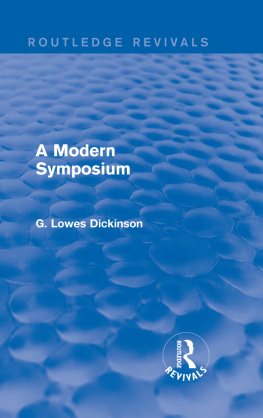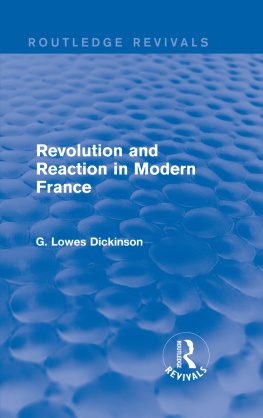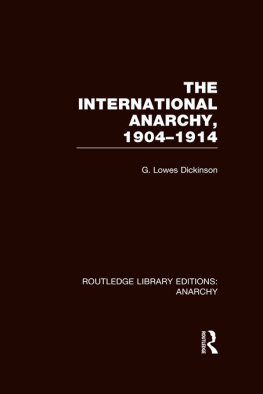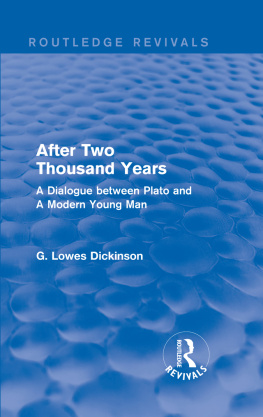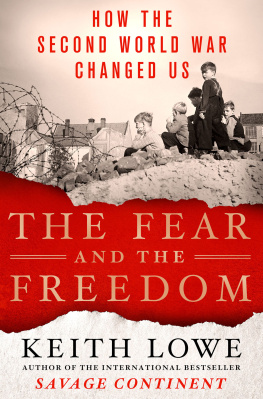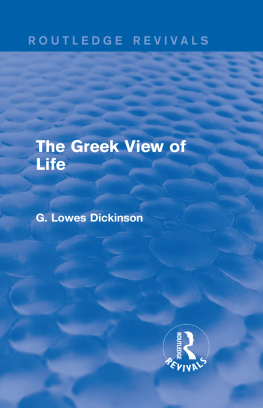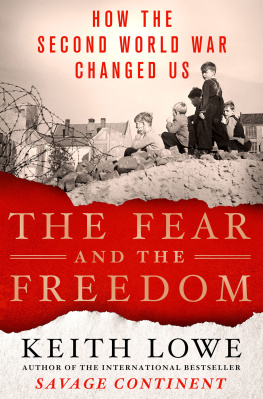G. LOWES DICKINSON
"LIFE LIKE A DOME OF MANY-COLOURED GLASS
STAINS THE WHITE RADIANCE OF ETERNITY"
LONDON
GEORGE ALLEN & UNWIN LTD
MUSEUM STREET
FIRST PUBLISHED IN 1905
REPRINTED 1930
REPRINTED 1934
PRINTED IN GREAT BRITAIN BY
UNWIN BROTHERS LTD., WOKING
FRATRUM SOCIETATI
FRATRUM MINIMUS
THE SPEAKERS
LORD CANTILUPE
A TORY
ALFRED REMENHAM
A LIBERAL
REUBEN MENDOZA
A CONSERVATIVE
GEORGE ALLISON
A SOCIALIST
ANGUS MACCARTHY
AN ANARCHIST
HENRY MARTIN
A PROFESSOR
CHARLES WILSON
A MAN OF SCIENCE
ARTHUR ELLIS
A JOURNALIST
PHILIP AUDUBON
A MAN OF BUSINESS
AUBREY CORYAT
A POET
SIR JOHN HARINGTON
A GENTLEMAN OF LEISURE
WILLIAM WOODMAN
A MEMBER OF THE SOCIETY OF FRIENDS
GEOFFRY VIVIAN
A MAN OF LETTERS
A MODERN SYMPOSIUM
dropcap-s
OME of my readers may have heard of a club known as the Seekers. It is now extinct; but in its day it was famous, and included a number of men prominent in politics or in the professions. We used to meet once a fortnight on the Saturday night, in London during the winter, but in the summer usually at the country house of one or other of the members, where we would spend the week-end together. The member in whose house the meeting was held was chairman for the evening; and after the paper had been read it was his duty to call upon the members to speak in what order he thought best. On the occasion of the discussion which I am to record, the meeting was held in my own house, where I now write, on the North Downs. The company was an interesting one. There was Remenham, then Prime Minister, and his great antagonist Mendoza, both of whom were members of our society. For we aimed at combining the most opposite elements, and were usually able, by a happy tradition inherited from our founder, to hold them suspended in a temporary harmony. Then there was Cantilupe, who had recently retired from public life, and whose name, perhaps, is already beginning to be forgotten. Of younger men we had Allison, who, though still engaged in business, was already active in his socialist propaganda. Angus MacCarthy, too, was there, a man whose tragic end at Saint Petersburg is still fresh in our minds. And there were others of less note; Wilson, the biologist, Professor Martin, Coryat, the poet, and one or two more who will be mentioned in their place.
After dinner, the time of year being June, and the weather unusually warm, we adjourned to the terrace for our coffee and cigars. The air was so pleasant and the prospect so beautiful, the whole weald of Sussex lying before us in the evening light, that it was suggested we should hold our meeting there rather than indoors. This was agreed. But it then transpired that Cantilupe, who was to have read the paper, had brought nothing to read. He had forgotten, or he had been too busy. At this discovery there was a general cry of protest. Cantilupe's proposition that we should forgo our discussion was indignantly scouted; and he was pressed to improvise something on the lines of what he had intended to write. This, however, he steadily declined to attempt; and it seemed as though the debate would fall through, until it occurred to me to intervene in my capacity as chairman.
"Cantilupe," I said, "certainly ought to be somehow penalized. And since he declines to improvise a paper, I propose that he improvise a speech. He is accustomed to doing that; and since he has now retired from public life, this may be his last opportunity. Let him employ it, then, in doing penance. And the penance I impose is, that he should make a personal confession. That he should tell us why he has been a politician, why he has been, and is, a Tory, and why he is now retiring in the prime of life. I propose, in a word, that he should give us his point of view. That will certainly provoke Remenham, on whom I shall call next. He will provoke someone else. And so we shall all find ourselves giving our points of view, and we ought to have a very interesting evening." This suggestion was greeted, if not with enthusiasm, at least with acquiescence. Cantilupe at first objected strongly, but yielded to pressure, and on my calling formally upon him rose reluctantly from his seat. For a minute or two he stood silent, humping his shoulders and smiling through his thick beard. Then, in his slow, deliberate way, he began as follows:
"Why I went into politics? Why did I? I'm sure I don't know. Certainly I wasn't intended for it. I was intended for a country gentleman, and I hope for the rest of my life to be one; which, perhaps, if I were candid, is the real reason of my retirement. But I was pushed into politics when I was young, as a kind of family duty; and once in it's very hard to get out again. I'm coming out now because, among other things, there's no longer any place for me. Toryism is dead. And I, as you justly describe me, am a Tory. But you want to know why? Well, I don't know that I can tell you. Perhaps I ought to be able to. Remenham, I know, can and will give you the clearest possible account of why he is a Liberal. But then Remenham has principles; and I have only prejudices. I am a Tory because I was born one, just as another man is a Radical because he was born one. But Remenham, I really believe, is a Liberal, because he has convinced himself that he ought to be one. I admire him for it, but I am quite unable to understand him. And, for my own part, if I am to defend, or rather to explain myself, I can only do so by explaining my prejudices. And really I am glad to have the opportunity of doing so, if only because it is a satisfaction occasionally to say what one thinks; a thing which has become impossible in public life.
"The first of my prejudices is that I believe in inequality. I'm not at all sure that that is a prejudice confined to myselfmost people seem to act upon it in practice, even in America. But I not only recognize the fact, I approve the ideal of inequality. I don't want, myself, to be the equal of Darwin or of the German Emperor; and I don't see why anybody should want to be my equal. I like a society properly ordered in ranks and classes. I like my butcher or my gardener to take off his hat to me, and I like, myself, to stand bareheaded in the presence of the Queen. I don't know that I'm better or worse than the village carpenter; but I'm different; and I like him to recognize that fact, and to recognize it myself. In America, I am told, everyone is always informing you, in everything they do and say, directly or indirectly, that they are as good as you are. That isn't true, and if it were, it isn't good manners to keep saying it. I prefer a society where people have places and know them. They always do have places in any possible society; only, in a democratic society, they refuse to recognize them; and, consequently, social relations are much ruder, more unpleasant and less humane than they are, or used to be, in England. That is my first prejudice; and it follows, of course, that I hate the whole democratic movement. I see no sense in pretending to make people equal politically when they're unequal in every other respect. Do what you may, it will always be a few people that will govern. And the only real result of the extension of the franchise has been to transfer political power from the landlords to the trading classes and the wire-pullers. Well, I don't think the change is a good one. And that brings me to my second prejudice, a prejudice against trade. I don't mean, of course, that we can do without it. A country must have wealth, though I think we were a much better country when we had less than we have now. Nor do I dispute that there are to be found excellent, honourable, and capable men of business. But I believe that the pursuit of wealth tends to unfit men for the service of the state. And I sympathize with the somewhat extreme view of the ancient world that those who are engaged in trade ought to be excluded from public functions. I believe in government by gentlemen; and the word gentleman I understand in the proper, old-fashioned English sense, as a man of independent means, brought up from his boyhood in the atmosphere of public life, and destined either for the army, the navy, the Church, or Parliament. It was that kind of man that made Rome great, and that made England great in the past; and I don't believe that a country will ever be great which is governed by merchants and shopkeepers and artisans. Not because they are not, or may not be, estimable people; but because their occupations and manner of life unfit them for public service.



